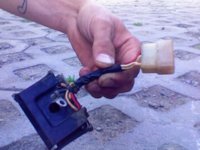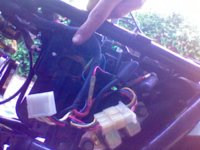SeattleUnderliner
2 wheels forever
Hey xs'ers.
Ugh. So my PO changed half of the fuses (main and headlight) to the blade type, and left the other two in the stock fuse box. I have been loosing my battery charge every few days, and have to charge it. Btw, my battery is good. I was in the middle of checking some of my charging system parts when i noticed my main fuse was/is blown. I went to my auto parts store and got new fuses and two more blade style fuse holders i plan to wire in.
Here is my problem and question:
I go to put my new fuse for the main in, and blap, it sparked and blew the fuse. So i disconect the battery, try again, plug in the battery, and blap....blown. I have a 25 bladed fuse in the grage, figure ill try one up, and see if that works. nope. blows that too.
Why is my main fuse blowing? Why will my battery not stay charged?
You may want to know that i am not running gauges or the electronics for them, or turn signals. I can't think of anything else that i removed. Would removing my turn sig make my main fuse blow? i did notice a little hissing today as i charged the battery from this little electric box on the Rt side of the battery box. not sure what it is. it has 3 yellow wires, 1 black, 1 red.
Please help. It was at least running yesterday. I seriously did not do anything today besides try and start the bike, notice no lights, assume my battery is dead again, and decide to start looking into my charging/electrical issues, which is when i found my blown fuse.
ugh.
 1979 special BTW. Thanks
1979 special BTW. Thanks
Ugh. So my PO changed half of the fuses (main and headlight) to the blade type, and left the other two in the stock fuse box. I have been loosing my battery charge every few days, and have to charge it. Btw, my battery is good. I was in the middle of checking some of my charging system parts when i noticed my main fuse was/is blown. I went to my auto parts store and got new fuses and two more blade style fuse holders i plan to wire in.
Here is my problem and question:
I go to put my new fuse for the main in, and blap, it sparked and blew the fuse. So i disconect the battery, try again, plug in the battery, and blap....blown. I have a 25 bladed fuse in the grage, figure ill try one up, and see if that works. nope. blows that too.
Why is my main fuse blowing? Why will my battery not stay charged?
You may want to know that i am not running gauges or the electronics for them, or turn signals. I can't think of anything else that i removed. Would removing my turn sig make my main fuse blow? i did notice a little hissing today as i charged the battery from this little electric box on the Rt side of the battery box. not sure what it is. it has 3 yellow wires, 1 black, 1 red.
Please help. It was at least running yesterday. I seriously did not do anything today besides try and start the bike, notice no lights, assume my battery is dead again, and decide to start looking into my charging/electrical issues, which is when i found my blown fuse.
ugh.

 1979 special BTW. Thanks
1979 special BTW. Thanks

